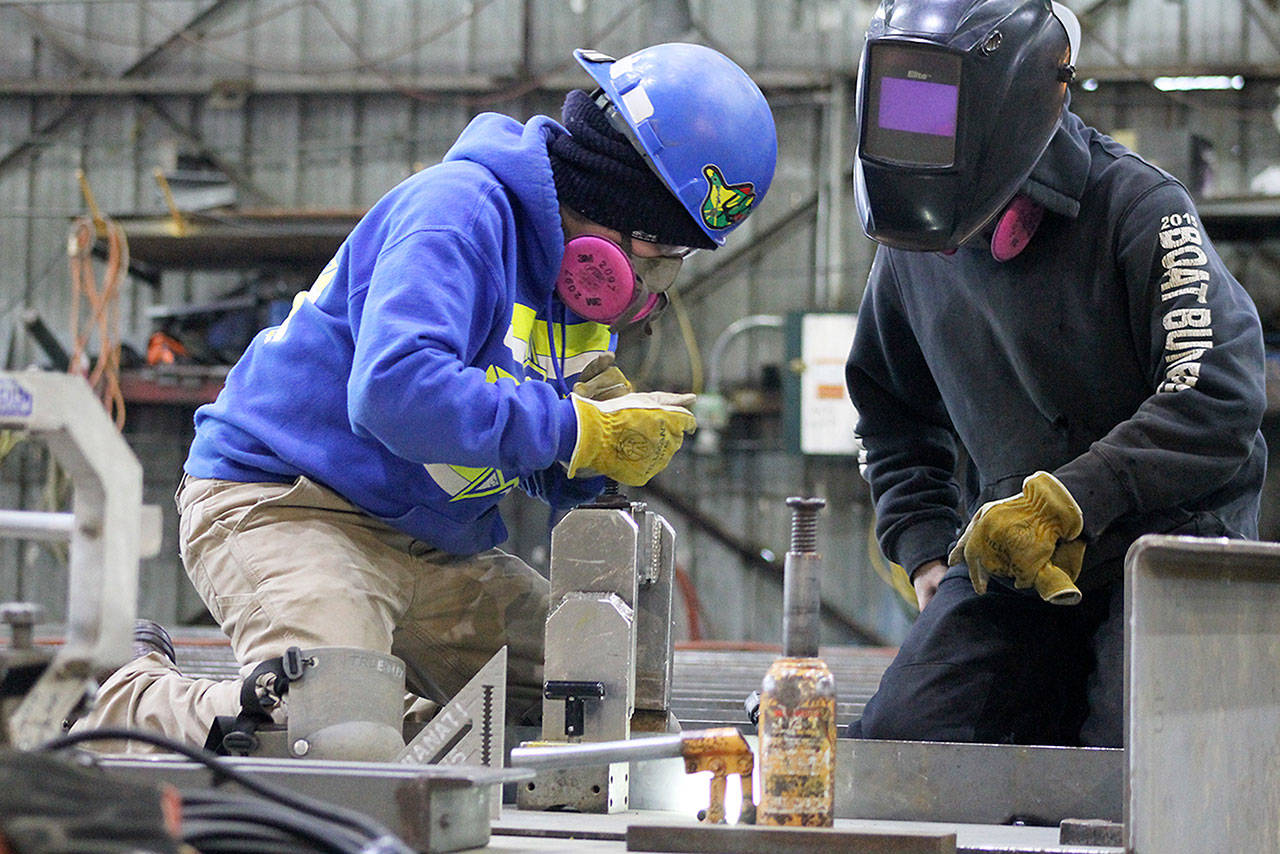Nichols Brothers Boat Builders is going to have a flock of new apprentices starting in January 2018.
The Northwest Workforce Council, which helps develop labor forces in Island, Skagit, Whatcom and San Juan counties, is allocating a “substantial chunk” of a nearly $1 million federal grant to the boat building company for expansion of its apprenticeship program. The federal Workforce Innovation and Opportunity Act funds, totaling $957,255, are being administered by Gov. Jay Inslee’s Career Connect Washington Initiative “to promote career learning experiences” and develop apprenticeship opportunities, according to a press release.
The 21-month grant will expand the Freeland-based company’s state-certified apprenticeship program, which began in 2013, from five to seven positions. It will also double its apprentice workforce from 48 to around 90 workers over the next year and a half.
The two new positions are marine tester and marine pipe welder, while a third — crane operator — may also be added later on.
The existing apprenticeship programs are marine shipfitter, marine pipefitter, machinist, marine painter and marine welder.
“We’re always taking on new apprentices because it’s basically how we continually develop the company,” CEO Gavin Higgins said. “This is really great news for the company to strengthen and improve the quality of the workforce and is bound to improve our efficiency.”
Higgins added the grant will also help the company be more competitive in a challenging boating industry.
Alex Kosmides, deputy director of the Northwest Workforce Council, said Nichols Brothers is considered a “key piece of the economy” on Whidbey Island as the largest private employer.
The council typically invests in three different industries: manufacturing, construction and health care. Nichols Brothers fit the bill, Kosmides said.
“It’s a good thing for Whidbey Island and especially the South End,” Komides said. “…It’s a good investment and apprenticeships are an effective way of training.”
Company officials are currently negotiating with the Northwest Workforce Council to determine what percentage of the grant it will receive. The federal funds are also going toward Science, Technology, Engineering and Mathematics (STEM) opportunities for 200 high school juniors and seniors in the region.
Nichols Brothers’ grant will fund wages for instructors, new training equipment, new curriculum and expanded training resources for the existing five apprenticeships. Wages for apprentices will be paid by the company.
The company has been operating the training and apprenticeship program on “a shoestring budget” since for the past four years, according to Kevin Corrigan, human resources director.
“It’ll provide a much needed boost in investment funds toward programs that are going to make a difference,” Corrigan said. “…This will be meaningful support that will allow us to improve the learning experience for our apprentices.”
The training ranges from hands-on work to coursework in classrooms. Each apprentice is paired with a journeyman, who acts as a mentor. If apprentices show competency throughout the three-year programs, they’ll eventually become fully certified journeyman.
“It’s about building their skills to replace our aging workforce,” Corrigan said. “We want to create a compelling workplace that people feel that they can continue to learn and grow and develop.”
Art Bailly, coordinator for training and apprenticeship workforce development, said the program provides practical experience that is specifically tailored to the company’s expectations and standards.
“If you don’t train your workforce the way you want them to do the job, you can’t expect them to do it,” Bailly said. “In order to have a more educated workforce, we need to train them. This grant will help that.”
Part of the grant will be spent on acquiring state-of-the-art training tools, such as a 3-D simulated paint sprayer by Connecticut-based company SimSpray.
The virtual reality system will provide instant feedback and develop muscle memory for the apprentices without wasting materials during training exercises or putting paint fumes into the environment.
Bailly said they’re also looking into a 3-D welding simulator, which will provide similar benefits.
“Before they even strike an arc, they’ll have a better understanding of the correct position to hold it and how to produce a good weld without going through test plate after test plate after test plate,” Bailly said.
Anyone above the age of 18 can apply, though apprentices are typically in their early 20s and have past trade experience to show they can handle the physical demands of the work, Corrigan said. The apprentices start at $18.94 an hour and see raises every time they reach the next level of competency, which is based on a four-tier system.
Nichols Brothers also plans to partner with local organizations that will help in getting the word out to young adults in the area. Those interested in apply should contact the company’s human resources department.



